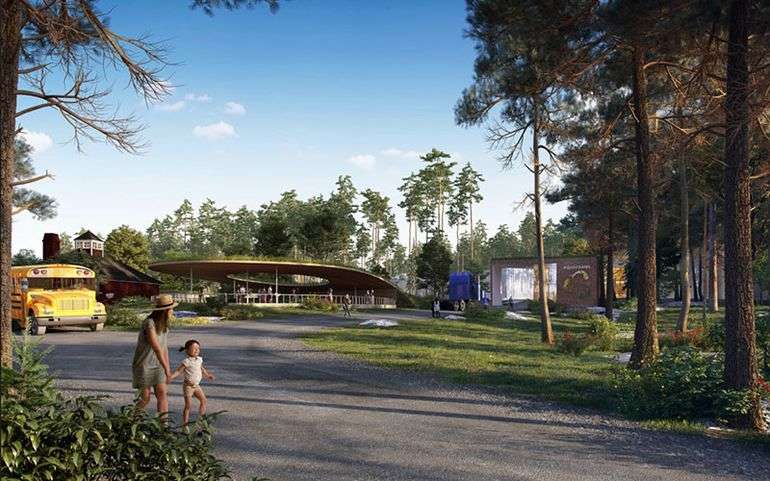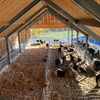
Plans for Whole Oceans, Nordic Aquafarms sites advance
 RENDERING / COURTESY WHOLE OCEANS
The Bucksport Town Council approved a tax increment finance district for Whole Oceans, which plans to build a state-of-the-art land-based salmon farm at the former Verso paper mill in Bucksport.
RENDERING / COURTESY WHOLE OCEANS
The Bucksport Town Council approved a tax increment finance district for Whole Oceans, which plans to build a state-of-the-art land-based salmon farm at the former Verso paper mill in Bucksport.
Two proposed land-based salmon farms have advanced in their march toward breaking ground.
In Bucksport, the town council approved a tax increment finance district for Whole Oceans.
And in its ruling on a lawsuit filed by an abutter in 2018, Waldo Superior Court upheld the city of Belfast’s rezoning decision that was to allow Nordic Aquafarms to build its operation there on a Route 1 property.
Whole Oceans
The town council approved the 92-acre TIF district for Whole Oceans after a public hearing July 11.
The proposed district established a 20-year arrangement to support nearly $190 million of investment for the Whole Oceans project, the project's attorney, James Saffian of Pierce Atwood, told the council in his presentation. The investment is expected to generate $43 million taxable value.
Jason Mitchell, president of Whole Oceans, said the district is key to getting the project off the ground.
“The project itself has a lot of benefit both for the town and for the company,” Mitchell said. “The TIF is one aspect of that.”
As a capital-intensive project, Mitchell said, there’s a long period between the point of becoming operational to actually generating revenue. The TIF is structured to address that challenge, he said.
According to the TIF agreement, the total estimated cost of the project, including site improvements, is $189.6 million. The project is expected to increase the site’s value by $42.2 million. The site’s current value is assessed at $1.4 million.
The TIF agreement calls for a term of 21 years, beginning July 1, 2020, and ending June 30, 2041. In the first five years, the agreement allows Whole Oceans to retain 100% of the tax increment on the project; to retain 75% of the increment over the next five years; and to retain 50% for the remainder of the term.
Town Manager Susan Lessard said that, while the town would return 100% of tax increment during the first five years, the town would receive 100% of the project’s business equipment tax, which during that five years is expected to be about $6 million.
Site demo underway
Mitchell explained there’s been quite a bit of progress on the site.
“Demolition is well underway,” he said.
The project is under review by the Maine Department of Environmental Protection, he said. It’s expected that an application for construction will be ready to go to the town for permitting within the next few weeks, he added.
“Our expectation is to do the earthwork this year,” Mitchell said. “We’ll do that through the winter. Our plan is to have a strong start in the spring.”
First-phase construction is expected to take two years. That will be followed by two years of growing the first batch of fish from egg to market size, he said.
“So the next four to five years is a pretty big challenge before the business is up and running in a production capacity,” he said.
Over that time, the company expects to grow to 75 jobs, he added.
The 10-year plan for becoming fully operational will potentially result in 200 jobs, he said.
In May, Portland-based Whole Oceans completed a purchase-and-sale agreement with American Iron and Metal Development USA LLC for a parcel on the site of the former Verso paper mill.
Emergent Holdings of Portland, formed exclusively to invest in aquaculture and agricultural markets in North America, is the parent company of Whole Oceans.
Whole Oceans plans to implement a “recirculating aquaculture systems” facility. In Phase 1, it will initially produce 5,000 metric tons of Atlantic salmon annually and expects to quickly grow to 10,000 metric tons of salmon production. One metric ton is 2,204 pounds. Over time, the company plans to increase capacity to 20,000 metric tons per year on the Bucksport site and up to 50,000 metric tons in the United States.
Nordic Aquafarms
In Belfast, Nordic Aquafarms achieved a victory when Waldo Superior Court upheld a rezoning decision by the city.

In April 2018, the Belfast City Council approved a zoning ordinance change that allows Nordic Aquafarms to move forward on its $150 million Phase 1 project to build one of the world’s largest indoor salmon farms on a 40-acre site off Route 1.
In July 2018, abutters Eleanor Daniels and Donna Broderick filed suit against the city, alleging the council’s actions violated state and local law, and sought to have the actions voided. But the court found there were no genuine issues of fact that could serve to justify reversal of the council’s actions, according to a news release emailed to Mainebiz.
“Nordic Aquafarms has remained confident that the court would rule in favor of the city, but the ruling came quicker than expected,” the company’s commercial director, Marianne Naess, said in the release. “We remain confident that the project will move forward and that we have a solid legal position.”










0 Comments